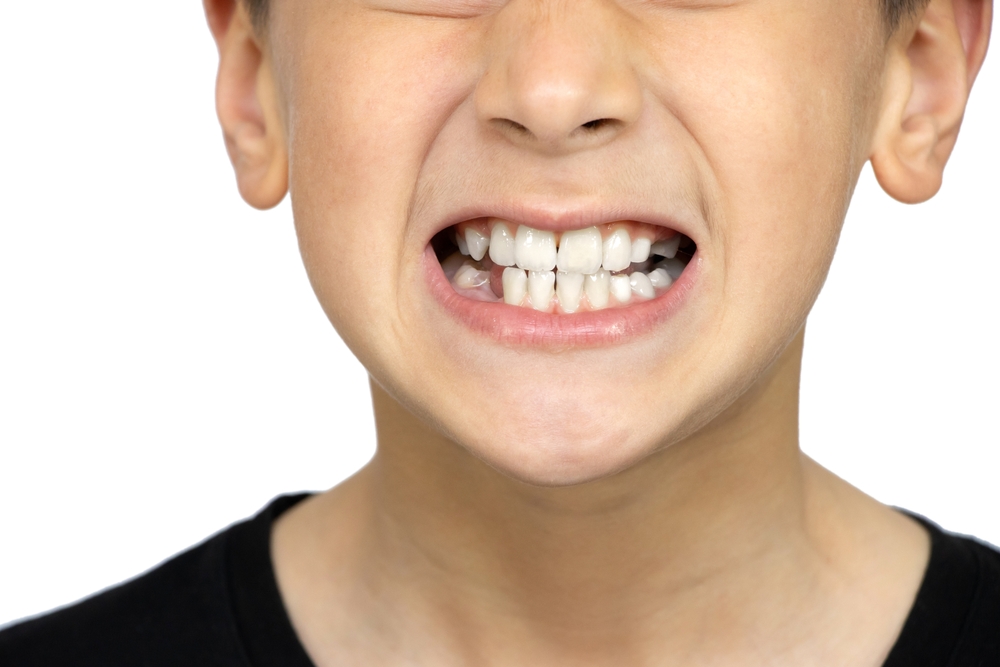
How Do You Treat Teeth Grinding in Children?
Teeth Grinding in Children
Teeth grinding in children, also called bruxism, often starts without any clear reason. Many parents first notice the sound—scraping or clicking—at night while their child sleeps. This habit might seem harmless at first, but it can wear down baby teeth and cause problems with jaw development. Although not every child with bruxism needs treatment, it’s important to know what to look for and when to take action.
You might not realize it right away, but bruxism often connects to stress, pain, or an improper bite. A child under pressure from school or changes at home might clench their jaw or grind their teeth without thinking. Some kids grind their teeth as a response to earaches or teething. Others do it because their upper and lower teeth don’t fit together properly. Knowing what causes your child’s grinding will help guide the right response.
How Can You Tell if Your Child is Grinding Their Teeth?
Many children who grind their teeth do it while they sleep, making it hard to catch at first. Parents often hear the sound before they see any damage. If you hear a clicking or scraping noise from your child’s room at night, they might be grinding their teeth. Some children also clench their jaws during the day when they feel anxious or frustrated.
You may also notice signs in your child’s mouth or behaviour. Teeth that look flat or worn down can be a sign of bruxism. Your child might complain about headaches, sore jaws, or pain when chewing. In some cases, they may also have trouble sleeping through the night. These physical changes often come before any serious dental damage, so early detection makes a difference.
If your child visits the dentist regularly, the dentist might be the first to notice a problem. Dentists can see small cracks, worn enamel, or pressure points in the mouth that show signs of grinding. They may also ask if your child snores or breathes through their mouth, which can be connected to teeth grinding. Regular checkups help catch these changes early, so treatment can start before the habit becomes harder to stop.
What Are Problems Caused by Teeth Grinding in Children?
Teeth grinding can lead to several physical and behavioural problems if it continues without treatment. While some children grow out of the habit, others experience damage to their teeth and discomfort in their jaws or face. These issues can affect how your child eats, sleeps, and feels during the day. You might not see the damage right away, but over time, the pressure from grinding can build up and cause lasting effects.
Bruxism can also interfere with your child’s quality of sleep. Many children who grind their teeth at night wake up tired, even after a full night in bed. Tired children may become irritable, have trouble focusing in school, or experience frequent headaches. If your child has started complaining about any of these symptoms or seems more tired than usual, teeth grinding could be part of the reason.
Here are common problems caused by teeth grinding in children:
- Worn-down teeth – Grinding puts pressure on the biting surfaces of the teeth, wearing them down over time and changing the way they fit together.
- Tooth sensitivity – As the enamel wears away, teeth become more sensitive to hot or cold foods and drinks.
- Jaw pain or tightness – Constant clenching can strain the jaw muscles, causing discomfort or tightness in the morning or after meals.
- Headaches – Muscle tension in the face and jaw can lead to headaches, especially in the temples or around the ears.
- Cracked or chipped teeth – Excessive grinding can weaken tooth structure, making teeth more likely to crack or chip during eating.
- Sleep disruption – Grinding often disrupts deep sleep, leading to restless nights and tiredness during the day.
You can also read our full guide on
Problems Caused by Teeth Grinding in Children and How To Treat Them
How Can You Treat Teeth Grinding in Children?
Treating teeth grinding in children depends on the cause and how often it happens. Some children stop grinding their teeth on their own as they grow, while others need support to break the habit. The right approach will depend on your child’s age, health, and how serious the grinding is. In many cases, your child’s dentist will suggest starting with simple changes at home before recommending a dental appliance.
You can often begin by making small adjustments to reduce stress and encourage better sleep. Since some kids grind their teeth due to anxiety or restlessness, improving their routine can ease the pressure on their teeth and jaws. If your child’s grinding is more severe, or if their teeth show signs of damage, a dentist may recommend using a habit breaking appliance to help stop it. Both methods can be used together to improve results.
At Home
You can take steps at home to help reduce or stop teeth grinding, especially in younger children.
Start by checking your child’s bedtime routine. A predictable and relaxing evening schedule helps children fall into a deeper sleep, which lowers the chance of grinding. Reading together, using a warm bath, or playing soft music can help calm your child before bed. Less screen time before sleep also helps reduce tension.
If your child feels stress during the day, try to find out what’s bothering them. Talk to them about school, friends, or anything that might cause frustration. Some children grind their teeth because they don’t know how to manage feelings like anger or anxiety. Helping your child talk through their day or offering stress-relief activities like drawing, stretching, or quiet play can lower grinding caused by emotion.
You can also ask your child to avoid chewing on non-food items. Chewing on pencils, toys, or fingernails can make grinding worse and keep the jaw muscles tense. Watch for this habit during homework or screen time. If your child grinds their teeth during the day, gentle reminders and small rewards for not doing it can help retrain the behaviour over time.
With a Habit Breaking Appliance
A dentist might recommend a habit breaking appliance if teeth grinding continues or causes damage. These appliances are custom-made dental devices that fit in the mouth and work by interrupting the grinding motion. They’re most often used for children six years and older, especially when home strategies haven’t worked.
The dentist will first check your child’s mouth and bite to decide if an appliance is the right option. The most common appliances for grinding are fixed and not removable, meaning they stay in the mouth for several months. These appliances prevent full contact between the teeth, reducing pressure and protecting against further wear. They also make the grinding motion less satisfying, which helps your child break the habit.
The appliance is cemented in place and usually stays in for three to six months. During this time, your child will visit the dental office every six to eight weeks for checkups. These appointments allow the dentist to check the fit, make any needed adjustments, and confirm that the grinding is stopping. Most children adjust quickly to the appliance, and any changes in speech or comfort usually fade within a few days.
Using a habit breaking appliance does not always replace other therapies. If your child has speech issues or trouble swallowing properly (such as with tongue thrust), the dentist may also recommend speech therapy or myofunctional therapy. The combination of physical support and behaviour training makes the treatment more successful and helps stop grinding for good.
You can also read our guide on Types of Habit Breaking Appliances and Their Cost
Kids Dental Group Can Help with Teeth Grinding
We understand how stressful it can feel when your child grinds their teeth and you’re not sure what to do next. You’re not alone—and you don’t have to figure it out on your own. At Kids Dental Group, we work with families every day to identify what’s causing the grinding and find the most effective way to stop it. Whether your child needs a simple home strategy or a custom appliance, we’ll guide you through the process step by step.
We invite you to book a free consultation with our team. We’ll examine your child’s teeth, explain your options clearly, and answer all your questions.
You can visit us at any of our locations in Richmond Hill, Markham, Stouffville, and Hillcrest.
We’re here to help your child rest easier and smile with confidence.
Contact us today
